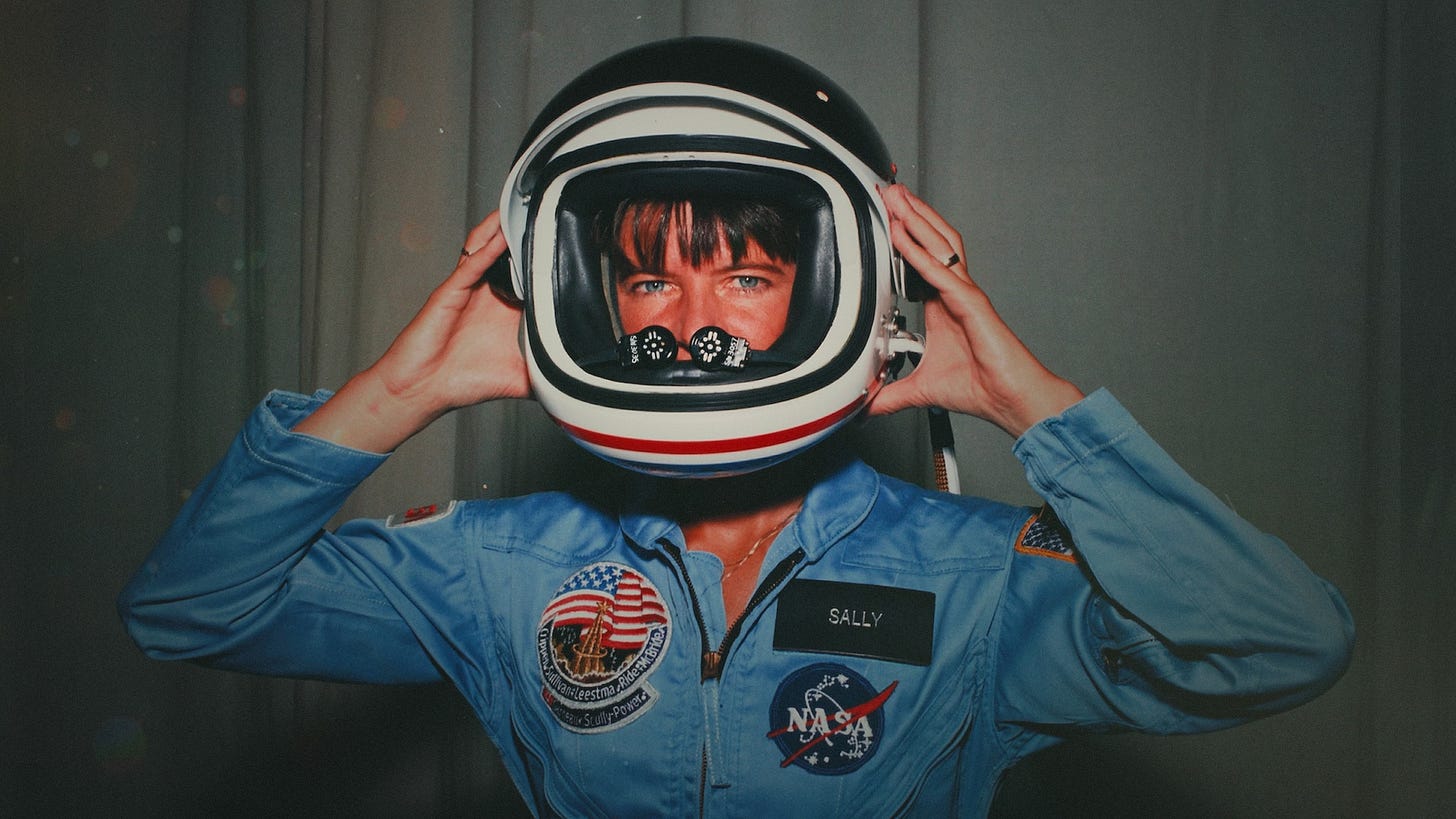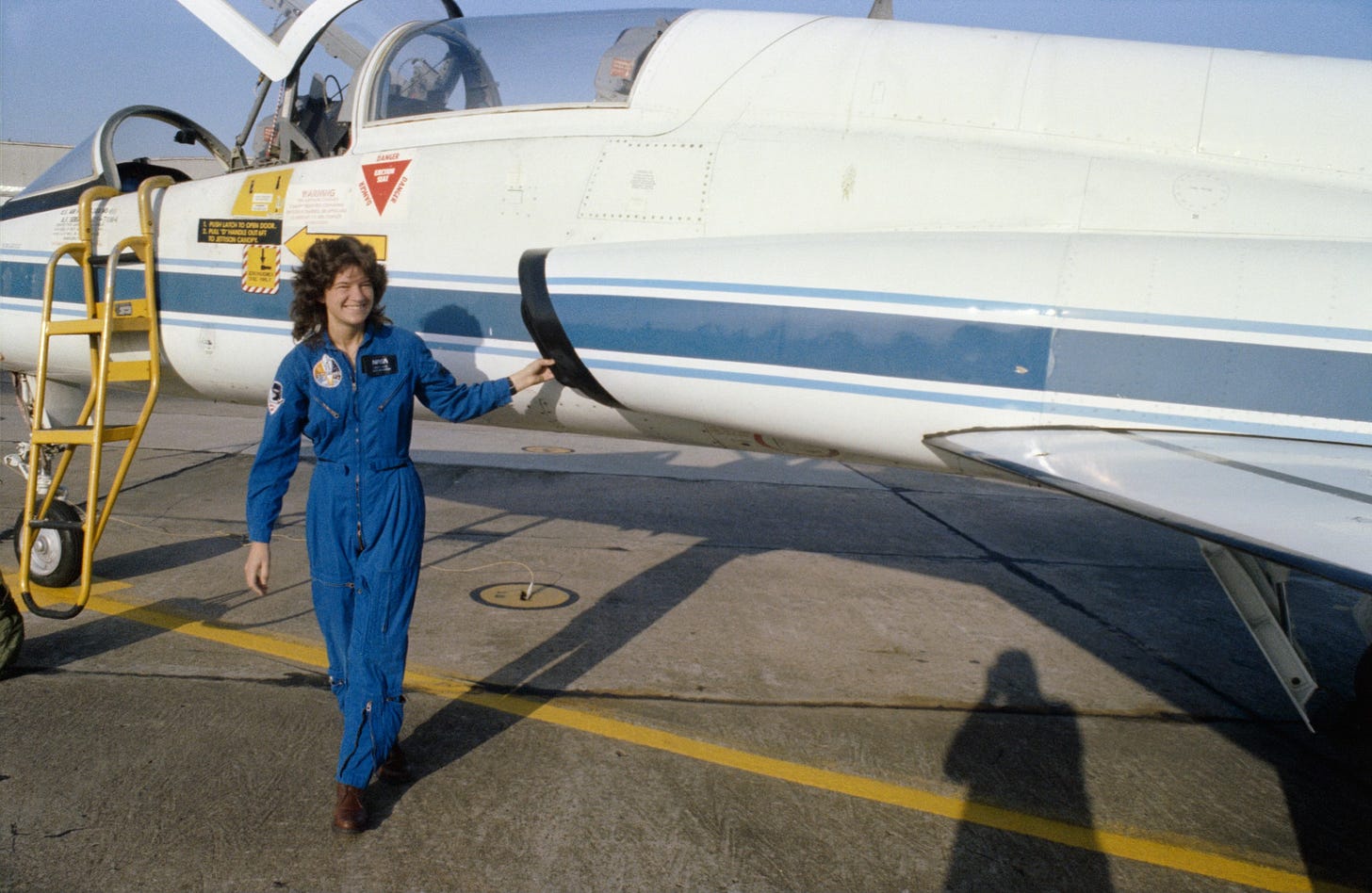'Sally' Executive Producer Tam O'Shaughnessy On The Incredible Life Of Sally Ride
The life partner of the groundbreaking astronaut reflects on Sally's everlasting legacy...
The documentary Sally premiered earlier in the year at the Sundance Film Festival and then premiered in June on National Geographic. It is an inside look at the life and legacy of astronaut and physicist Sally Ride, the first American Woman to fly in space. Directed by Cristina Costantini (Science Fair, Own the Room), it also explores Sally's long-term relationship with Tam O'Shaughnessy. O'Shaughnessy, a children's writer, professor, and former professional tennis player, was instrumental in keeping the legacy of her life partner alive with this loving tribute. O'Shaughnessy recently spoke to Immersive via Zoom about bringing this documentary to life.
[This conversation has been edited for clarity and length.]
I'm curious how the project came about. Was it something that you had initiated, or did people contact you? What was that process like?
I received a call from Dan Cogan of Story Syndicate, and he informed me that National Geographic Films was interested in making a documentary film about Sally, which would also feature our relationship. I liked that idea. I'd been approached to create a TV miniseries movie right after Sally died, and I just figured too many liberties would be taken with the truth. A documentary with Nat Geo; I just thought that was great.
Christina Costantini contacted National Geographic and suggested that they do a documentary film about Sally. They told her, "We're already working on one with Tam and Story Syndicate." Then I met Christina, and I fell in love with her vision for the film. I liked that she was influenced by Sally when she was a young girl. It just felt like the team was the right team to create something good and essential. I was all in, then Christina got a call from Nat Geo, and they offered her the chance to direct. So it all just came together.
That's excellent when it works out. How long did you spend being interviewed, and how difficult was it to discuss the past?
The beauty of it was that I liked and trusted Christina, and I just felt so comfortable with her. When she was asking me questions, it felt smooth and relatively easy. There were certainly hard parts talking about Sally getting sick, her passing away, you know. We actually spent a lot of time talking. I think I was interviewed for maybe two and a half days. I was interviewed in a studio and also in my home here in Atlanta a couple of times.
I love at-home interviews. Interview subjects are more comfortable at home and in their own element.
I think it was nice for Christina to be in the home and see some of Sally's possessions see artwork that we had bought together, and other various things.
Talk about the process of going through her effects and finding stuff for the production. Did you have everything really organized, or were you going into attics and storage units?
Shortly after Sally died, I realized that she was a borderline hoarder. She had saved everything from her childhood, including her driver's license and the certificates of national tennis ranking essays she wrote at Stanford, as well as a significant amount from NASA. I realized that it was essential for her work to be archived on a national level. I gifted a substantial amount of her belongings to the Smithsonian National Air and Space Museum in 2013.
I kept some things that I just felt were too personal or didn't want to give away yet. But, because I had to do that for the Smithsonian back in 2013, I had it fairly well organized. There were maybe four or five boxes of photos and memorabilia. Then I had a chest with her flight suit, helmet, NASA T-shirts, leather jacket, and a cool astronaut jacket.
I wonder if Sally being out posthumously... if you feel like that had any effect on more public acceptance and how the film figures into that...
I think the film will help people see that she's this really wonderful human being who was extremely ultra-successful, and yet she had to hide her relationship just because it was with another woman. I think that they're gonna get people that aren't pro-LGBTQ, although I think like 70% of our country is now. I think it'll help the younger generation just see the earlier battles that people had to go through and that are now coming back to the forefront. We thought we were past those, but we're not.
I love the fact that you keep her memory alive. Talk a little bit about some of the organizations that you work with and the work that you do, which, of course, includes this documentary.
I think the biggest thing Sally and I did together was we started Sally Ride Science with three of our friends in 2001, and next year will be the 25th anniversary. We offer programs for students in third grade through 12th grade, as well as summer hands-on workshops for boys and girls. Then we have many other programs and science books. We have a great website, and we strive to inspire kids to become scientifically and mathematically literate, even if they don't pursue a STEM career. It's crucial for their own lives, making health decisions, decisions about the environment, and decisions about leadership in the White House...
We spent years building the company, and now we're a nonprofit at the University of California, San Diego, but we're carrying with the mission that we started with. Sally's name is just magic with people; in a way, she's alive and still doing her work through the company. You know, after she died, NASA wasn't gonna do anything to honor Sally.
Really?
I got no calls, nothing. Neil Armstrong died a few weeks after Sally died, and suddenly, there was a national celebration memorial at the National Cathedral in Washington, DC. I got really upset, and I called the former senator, Barbara Mikulski. At the time, she served on the appropriations committee, which meant she was responsible for NASA's budget. She called the head of NASA, Charlie Bolden, and said, what are you doing, Charlie? We worked it out, and then we had a national tribute to Sally at the Kennedy Center in Washington. Not long after, a research vessel was named after her. There was also a forever stamp and a quarter.
What's it like being on the other side of this documentary? What kind of feedback have you gotten on this, and what does it feel like to share this with the world?
The reviews are, for the most part, overwhelmingly positive. People appreciate that it's a story of the public and the personal life of Sally, the whole story. I think the reception has been fantastic. I hope it reaches people, inspires them, and gives them hope to be a little bit like Sally and be true to themselves. Don't let people try to tell you how to live your life or whom you should love.







